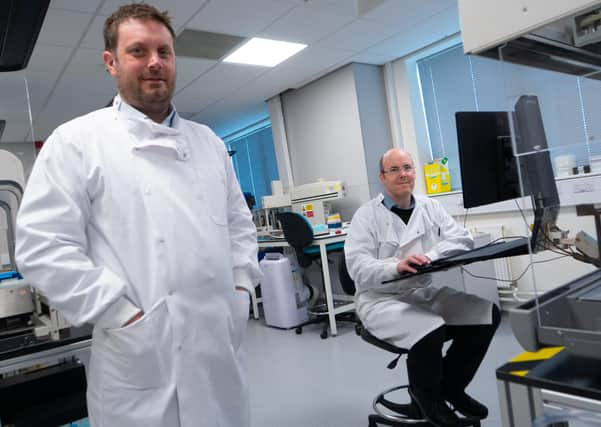He left school with no qualifications but is now on the brink of a Covid test breakthrough


Dr Arron Tolley is one of the co-founders of York-based Aptamer Group, which is helping lead the charge for a rapid Covid-19 test that can deliver results in seconds. The company’s technology uses aptamers, synthetic molecules made from DNA or RNA that can bind to targets highly selectively. Dr Tolley and his colleagues have developed aptamers that bind directly to the Covid-19 virus particle and are producing an antigen test which will detect the presence of the virus in saliva. He says the company is just a couple of weeks away from having a prototype device ready and “around a month away” from having a design ready for manufacture. The work involved to get this far has impressed everyone from investors to the big pharmaceutical companies which are now collaborating with Aptamer Group. But when the test is finally launched, perhaps no-one will be more surprised than the staff at Dr Tolley’s old school in Halesowen, near Birmingham, which he left at the age of 16 without any qualifications, before working in factories and construction. “I have ADHD [attention deficit hyperactivity disorder] and there just wasn’t the support or understanding when I was at school, so I was labelled a disruptive student. I just ‘fell through the cracks’,” Dr Tolley told The Yorkshire Post. He adds: “The ADHD is a great asset to me now, because it gives me boundless energy and determination. What most people would consider a ‘disability’, I’ve turned to my advantage.” The success of Dr Tolley’s journey from high-school drop-out to biotech company director can be attributed largely to his own hard work, but some of the credit must also go to his parents, who made his about-turn possible. “I was having some food with my dad on a Saturday morning and I just said to him I was sick of life as it was and I wanted to change things,” Dr Tolley recalls. “I said I was going to pull my life together, focus, go to university, study, get a PhD and contribute something to the scientific community. My dad said ‘OK, we’ll support you in that’, and he worked extra shifts at the factory to pay for my books and buy me my first computer.” Dr Tolley was 22 then, and 20 years later he now leads a business with three divisions – contract research, diagnostic development and therapeutics – employs 35 people and is collaborating with some big names on some hefty problems. It is working with Cancer Research UK on treating leukaemia, with AstraZeneca on combatting kidney disease, with Integumen to develop reagents for the detection of Covid in waste water, and with Cytiva (previously GE Life Sciences) to develop the rapid Covid test. This one is important because it could make possible the kind of universal, frequent testing envisaged by the Government’s Operation Moonshot, which aims for 10 million tests a day by early 2021. “Testing weekly, or even more frequently, is probably where we need to be, because the initial spike of viral antigens present in the saliva, for a saliva-based test, takes several days to build up,” says Dr Tolley. “Then, as the body starts to fight off the infection, you get a reduction in viral antigen in saliva, and you end up with antibodies then being produced. “At that point, though, you’re no longer massively infectious, and that’s kind of the problem. So you need to capture somebody while they’re infectious. So more frequent and regular testing is key to unlocking the economy and getting things moving again as a country.” Doing the kind of work Aptamer does is expensive – the target antigens it works with can cost hundreds of thousands of pounds – and finding funding has been a constant challenge. “We’ve had absolutely no funding from government whatsoever,” says Dr Tolley. “All of the development that we’ve done has been self-funded through investors who would like to see their money put to good use in terms of developing solutions to Covid.” Unusually for a business that has had to rely on outside investors, Dr Tolley and partner Dr Dave Bunka still own just over 50 per cent of the company. “We’ve done it the good old-fashioned bootstrapped way and built the company slowly and steadily,” he says. “A lot of companies take tens of millions to get to where we’ve got to on a few million, and I attribute that to having a brilliant co-founder and scientific team in the business.” The desire to retain a controlling stake in the company was not motivated by money, although he concedes that’s nice, but rather by the will to solve problems and use science to tackle medical problems. He also sees the company’s collaboration with AstraZeneca an important milestone, “because it shows that our technology is being taken seriously by Big Pharma”. This is particularly important because Dr Tolley has no intent-ion of letting Aptamer Group remain a small company, and he’s not afraid of the effort it will take. “I’m very tenacious and driven, and I won’t let anything beat me,” he says. “If you come from working in a factory and then you get a job like this, you realise that it’s a privilege to be in this kind of a position. I’ve done a job that was hard work before, and this is not really hard work for me. “I’d like to get the company to a several hundred million pound valuation and get the Covid test out there and also work on treating diseases with novel modalities that we can develop – solving the problems that Big Pharma can’t currently solve.” Once a disruptor, it seems, always a disruptor.